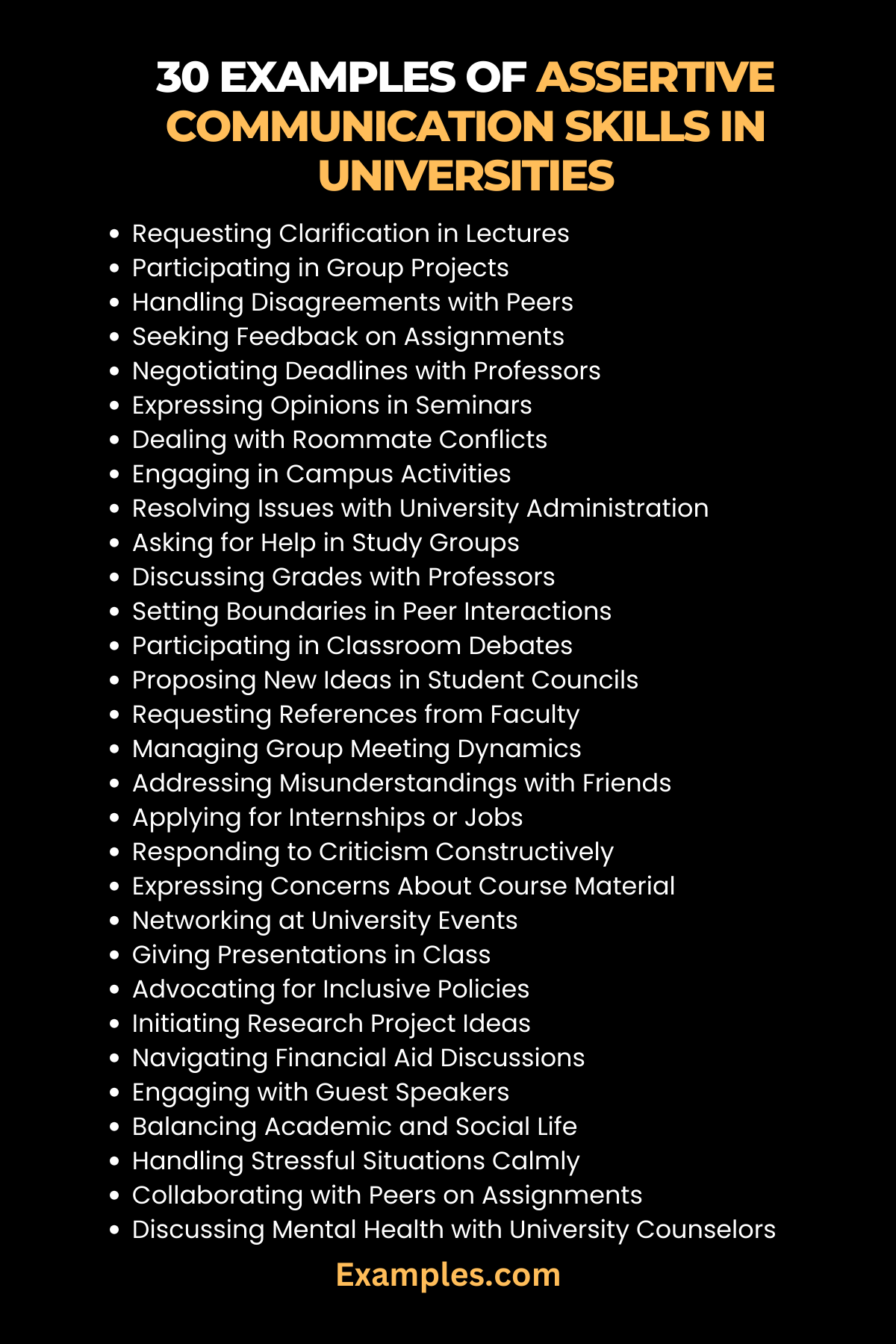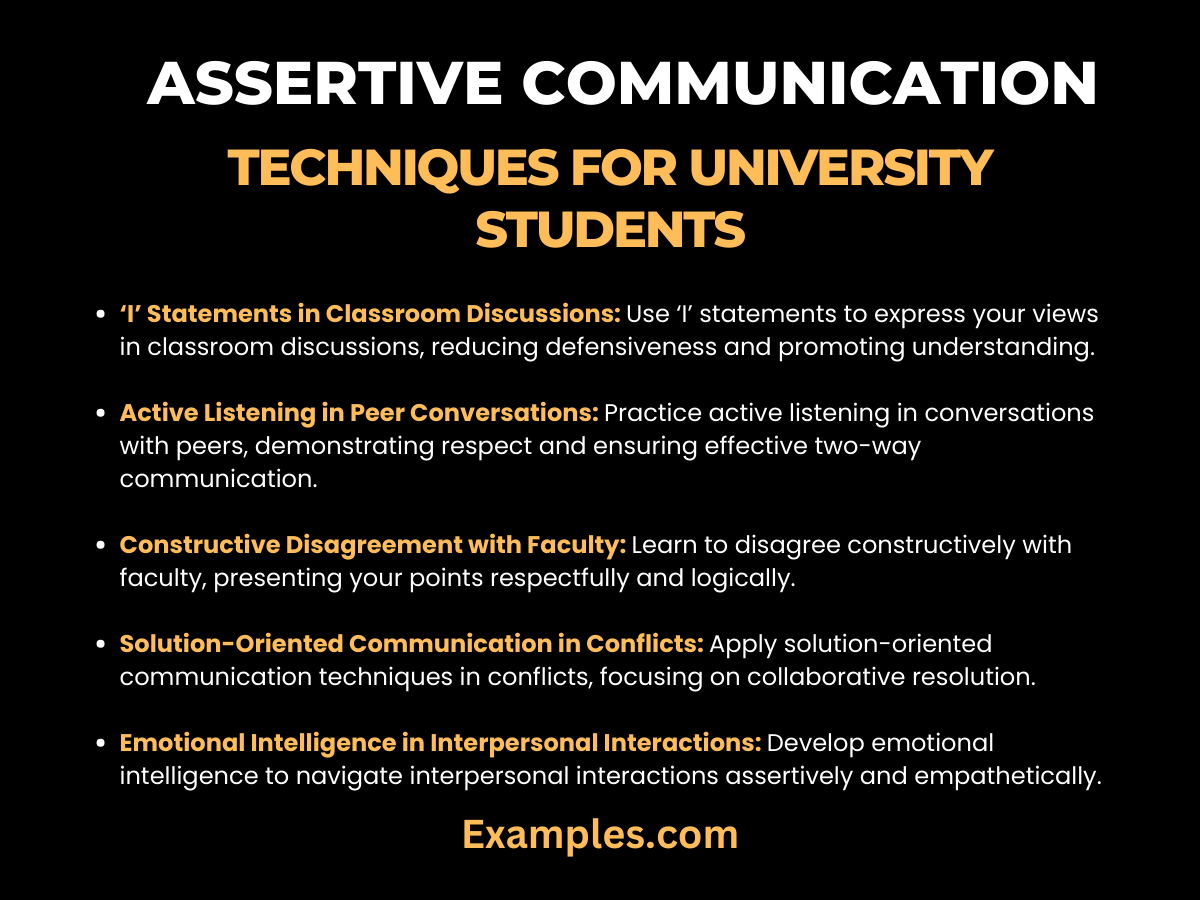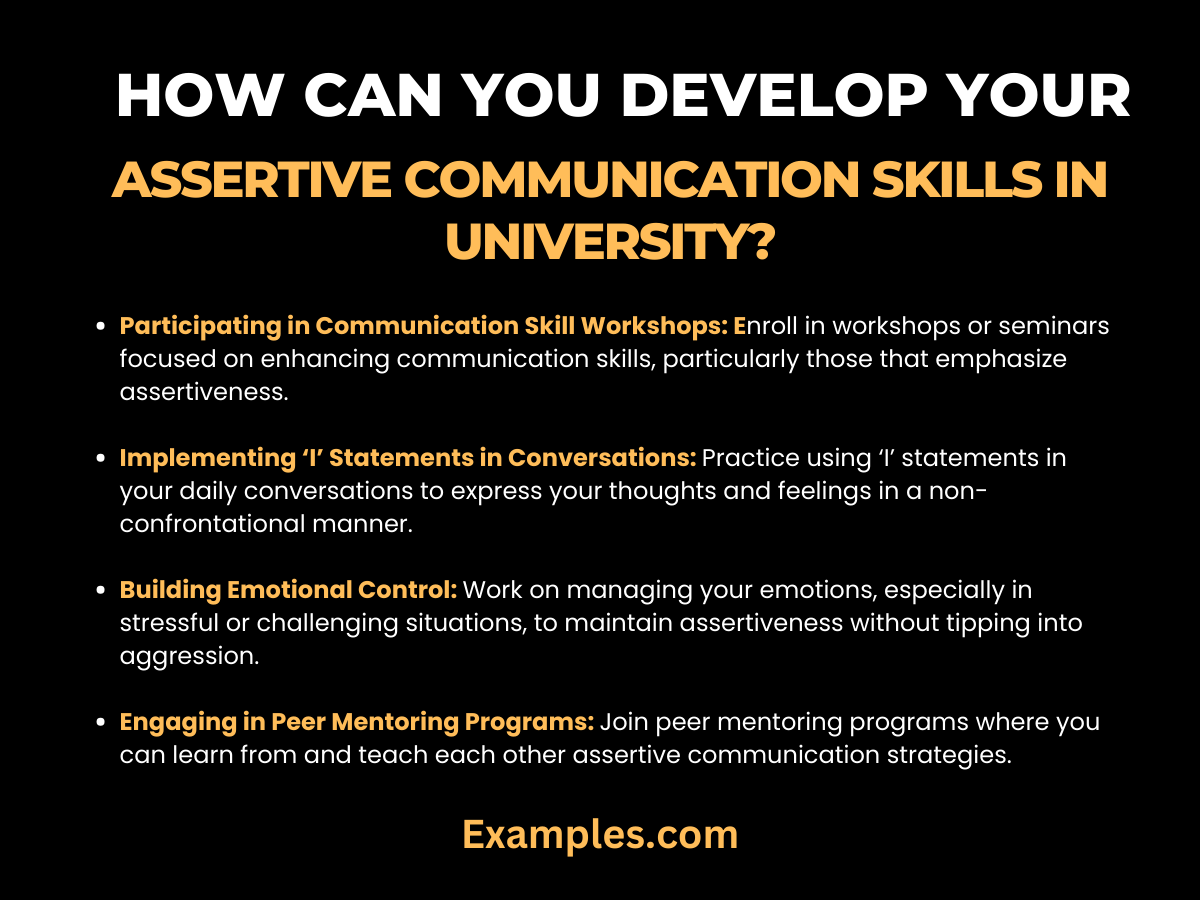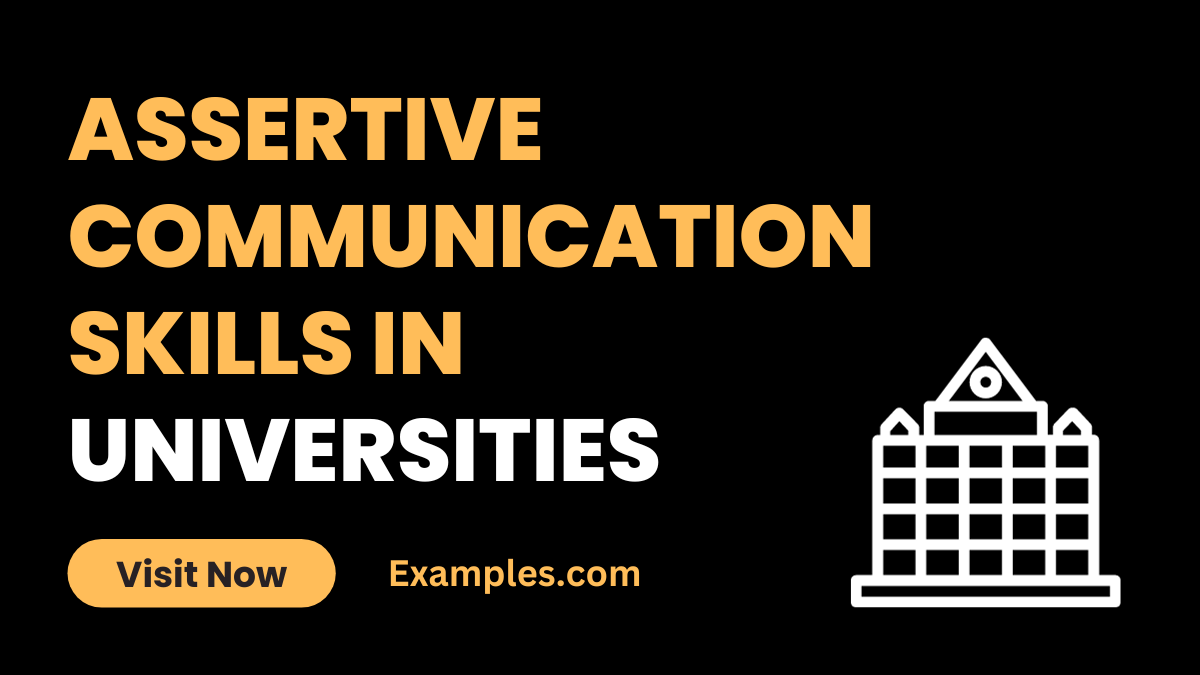29+ Assertive Communication Skills in Universities Examples
Embark on a transformative journey with our Complete Guide to Assertive Communication Skills in Universities. This guide is tailored to empower university students with the necessary skills to communicate assertively and effectively. Packed with practical communication examples, it’s designed to enhance dialogues in academic and social settings. Discover how to articulate your ideas with confidence, navigate diverse opinions with respect, and create meaningful interactions. Whether it’s classroom discussions or campus life, these skills are essential for a successful university experience.
30 Examples of Assertive Communication Skills in Universities
Discover the art of effective communication in academic settings with our collection of 30 Examples of Assertive Communication Skills in Universities. This resource is designed to provide students with practical, real-world scenarios, illustrating how to communicate assertively in various university contexts. From classroom discussions to interactions with peers and faculty, these examples showcase the power of clear, respectful, and confident communication. Enhance your university experience by mastering these essential skills, which are crucial for both academic success and personal growth.

- Requesting Clarification in Lectures: Politely ask for clarification on complex topics during lectures, showing engagement and desire to understand fully.
- Participating in Group Projects: Contribute ideas assertively in group projects, while valuing and acknowledging the suggestions of others.
- Handling Disagreements with Peers: Approach disagreements with classmates respectfully, using ‘I’ statements to express your viewpoint without belittling theirs.
- Seeking Feedback on Assignments: Request constructive feedback from professors on your assignments, showing a proactive approach to learning.
- Negotiating Deadlines with Professors: Discuss deadline extensions with professors by clearly stating your situation and proposing a reasonable alternative.
- Expressing Opinions in Seminars: Share your perspectives in seminars confidently, backing them up with reasoned arguments and evidence.
- Dealing with Roommate Conflicts: Address conflicts with roommates calmly and directly, focusing on finding a mutually agreeable solution.
- Engaging in Campus Activities: Volunteer for leadership roles in campus activities, communicating your ideas and plans assertively.
- Resolving Issues with University Administration: When facing administrative issues, communicate your concerns clearly and seek a collaborative resolution.
- Asking for Help in Study Groups: Don’t hesitate to ask for help in study groups, framing your request in a confident yet respectful manner.
- Discussing Grades with Professors: Approach discussions about grades with professors assertively, seeking understanding and ways to improve.
- Setting Boundaries in Peer Interactions: Communicate your personal boundaries to peers clearly, ensuring mutual respect in relationships.
- Participating in Classroom Debates: Engage in classroom debates by asserting your views respectfully and listening to opposing arguments.
- Proposing New Ideas in Student Councils: Present new ideas in student council meetings confidently, encouraging feedback and discussion.
- Requesting References from Faculty: Ask for references or recommendations from faculty politely, acknowledging their time and effort.
- Managing Group Meeting Dynamics: In group meetings, ensure everyone’s voice is heard by facilitating an inclusive and respectful discussion.
- Addressing Misunderstandings with Friends: Clear up misunderstandings with friends through open, honest, and respectful communication.
- Applying for Internships or Jobs: Communicate your skills and aspirations assertively in applications and interviews.
- Responding to Criticism Constructively: When receiving criticism, listen openly and respond by acknowledging valid points and discussing improvement.
- Expressing Concerns About Course Material: If course material is challenging or unclear, discuss your concerns assertively with your professor.
- Networking at University Events: Network assertively at university events, introducing yourself and engaging in meaningful conversations.
- Giving Presentations in Class: Deliver class presentations confidently, maintaining eye contact and a steady, clear voice.
- Advocating for Inclusive Policies: Champion inclusive policies on campus by articulating your stance clearly to the relevant authorities.
- Initiating Research Project Ideas: Propose research project ideas to professors assertively, outlining your vision and expected outcomes.
- Navigating Financial Aid Discussions: When discussing financial aid, be clear and assertive about your needs and circumstances.
- Engaging with Guest Speakers: Ask insightful questions and engage in discussions with guest speakers, demonstrating your interest and assertiveness.
- Balancing Academic and Social Life: Communicate your need for balance between academic and social life to friends and study partners.
- Handling Stressful Situations Calmly: In stressful academic situations, communicate calmly and assertively, seeking support or solutions as needed.
- Collaborating with Peers on Assignments: Collaborate effectively with peers on assignments by clearly stating your ideas and being open to theirs.
- Discussing Mental Health with University Counselors: Speak openly and assertively with university counselors about mental health concerns, seeking the support you need.
Assertiveness Training: Key for University Students
Assertiveness Training is a crucial element for university students, serving as a cornerstone for effective communication and personal development. This section delves into the significance of such training in the academic arena. Through assertiveness training, students learn to express themselves clearly and confidently, balance their needs with others, and navigate the complexities of university life. This training is not just about speaking up; it’s about cultivating a communication style that is both respectful and empowering.
- Practicing Scenario-Based Assertive Responses: Engage in role-play exercises that mimic university situations, learning to respond assertively in various academic and social contexts.
- Self-Awareness Workshops: Participate in workshops aimed at enhancing self-awareness, crucial for understanding and developing an assertive communication style.
- Feedback Reception Exercises: Learn to accept feedback positively, focusing on growth and improvement in academic and personal spheres.
- Assertive Goal Setting: Practice setting and communicating personal and academic goals assertively, ensuring your objectives are clear and achievable.
- Assertiveness in Group Dynamics: Learn to assert your views in group discussions and projects while respecting the opinions of others.
- Effective Use of ‘No’: Develop the skill to say ‘no’ assertively in scenarios where requests conflict with your priorities or values.
- Building Assertive Body Language: Focus on non-verbal cues like posture, eye contact, and gestures that convey confidence and assertiveness.
- Assertive Public Speaking Practice: Enhance public speaking skills by practicing assertive communication in presentations and speeches.
- Mindfulness and Assertiveness Connection: Explore mindfulness techniques to remain calm and composed, aiding assertive communication under stress.
- Assertive Communication in Digital Platforms: Learn the nuances of assertive communication in digital platforms, essential for online classes and discussions.
Assertive Communication Techniques for University Students
Assertive Communication Techniques for University Students are essential tools for navigating the academic environment with confidence and respect. These techniques help students articulate their needs and opinions effectively, ensuring they are heard and understood. From classroom discussions to interactions with faculty and peers, mastering these techniques fosters a more fulfilling university experience, characterized by clear, respectful, and impactful communication.

- ‘I’ Statements in Classroom Discussions: Use ‘I’ statements to express your views in classroom discussions, reducing defensiveness and promoting understanding.
- Active Listening in Peer Conversations: Practice active listening in conversations with peers, demonstrating respect and ensuring effective two-way communication.
- Constructive Disagreement with Faculty: Learn to disagree constructively with faculty, presenting your points respectfully and logically.
- Solution-Oriented Communication in Conflicts: Apply solution-oriented communication techniques in conflicts, focusing on collaborative resolution.
- Emotional Intelligence in Interpersonal Interactions: Develop emotional intelligence to navigate interpersonal interactions assertively and empathetically.
- Clear and Direct Request Articulation: Practice articulating requests clearly and directly, whether seeking clarification, assistance, or resources.
- Balancing Assertiveness and Empathy: Find the balance between being assertive and showing empathy in your communications, essential for building positive relationships.
- Handling Criticism Constructively: Learn techniques to handle criticism constructively, using it as a tool for personal and academic growth.
- Assertiveness in Online Communications: Adapt assertiveness techniques to online communications, essential for emails, online forums, and virtual meetings.
- Self-Advocacy in Academic Settings: Develop self-advocacy skills, assertively communicating your academic needs and aspirations.
What Ways to Improve Assertive Communication Skills in Universities?
Improving assertive communication skills in universities is a vital aspect of a student’s personal and academic development. This detailed guide explores various effective methods to enhance these skills, crucial for navigating the university landscape confidently. By focusing on assertive communication, students can learn to articulate their thoughts and needs clearly while respecting others’ perspectives. This section offers insights into practical strategies, from classroom interactions to extracurricular activities, enabling students to cultivate a balanced and effective communication style.
- Engagement in Active Listening Workshops: Participate in workshops that emphasize active listening, a key component of assertive communication. This skill ensures you understand others’ viewpoints and respond thoughtfully.
- Practicing Open and Honest Expression: Regularly engage in activities that encourage open and honest expression. This could include debate clubs or discussion groups, where you can practice articulating your opinions clearly.
- Role-Playing Different Scenarios: Role-play various university-related scenarios, from academic discussions to social interactions, to practice and improve your assertive communication responses.
- Seeking Feedback and Self-Reflection: Actively seek feedback on your communication style from peers and mentors and engage in self-reflection to identify areas for improvement.
- Incorporating Assertiveness into Daily Interactions: Make a conscious effort to incorporate assertiveness into your daily interactions, whether it’s in class, during group projects, or in social settings.
- Utilizing University Resources: Make use of university resources, such as counseling centers or communication skills workshops, which often offer personalized guidance on developing assertive communication.
- Learning from Assertive Communication Examples: Analyze and learn from assertive communication examples in literature, media, or real-life university scenarios.
- Developing Empathy and Understanding: Cultivate empathy by trying to understand diverse perspectives, which is crucial for balancing assertiveness with sensitivity.
How Can You Develop Your Assertive Communication Skills in University?
Developing assertive communication skills in university settings is an ongoing process that requires dedication and practice. This comprehensive guide offers a roadmap for students to build and refine their assertive communication abilities. These skills are not only beneficial for academic success but also play a crucial role in personal growth and future professional interactions. The focus here is on practical steps and assertive communication techniques that students can adopt to become more confident and effective communicators.

- Participating in Communication Skill Workshops: Enroll in workshops or seminars focused on enhancing communication skills, particularly those that emphasize assertiveness.
- Implementing ‘I’ Statements in Conversations: Practice using ‘I’ statements in your daily conversations to express your thoughts and feelings in a non-confrontational manner.
- Building Emotional Control: Work on managing your emotions, especially in stressful or challenging situations, to maintain assertiveness without tipping into aggression.
- Engaging in Peer Mentoring Programs: Join peer mentoring programs where you can learn from and teach each other assertive communication strategies.
- Regular Practice in Diverse Settings: Consistently practice assertive communication in diverse settings – from academic discussions to casual conversations – to build and reinforce your skills.
- Seeking Constructive Feedback: Regularly ask for feedback on your communication style from trusted peers or mentors and use this feedback for continual improvement.
- Incorporating Body Language Awareness: Be aware of and improve your body language to ensure it aligns with assertive communication, such as maintaining eye contact and an open posture.
- Utilizing Online Resources and Tools: Leverage online resources and tools, such as assertive communication worksheets or interactive scenarios, for self-guided learning and practice.
- Balancing Assertiveness with Respect: Always strive to balance assertiveness with respect for others, recognizing that effective communication involves both speaking up for yourself and valuing others’ perspectives.
- Continuous Learning and Adaptation: Stay open to learning and adapting your communication style as you encounter new experiences and challenges throughout your university journey.
In conclusion, As you reach the conclusion of exploring Assertive Communication Skills in Universities, it’s evident that these skills are not merely academic necessities but vital life tools. They empower students to navigate complex interactions, both within the university and beyond, fostering a sense of confidence, clarity, and mutual respect. The journey of cultivating assertive communication is one of continuous learning and growth, enhancing not only personal relationships but also paving the way for professional success.
To delve deeper into the development of these essential skills, the Counseling Center at North Dakota State University offers a valuable resource on assertiveness skills, providing practical advice and strategies tailored for university students here. Additionally, for a more comprehensive understanding, explore the guide on assertive communication skills at California State University, Long Beach, which offers in-depth insights into creating understanding and intimacy through effective communication here. These resources serve as excellent supplements to enhance your assertive communication journey, offering guidance and techniques that are beneficial for both academic and personal growth.



